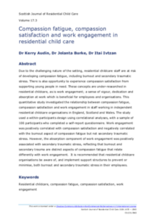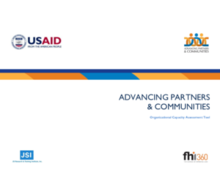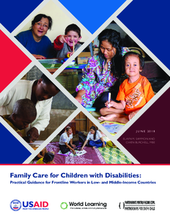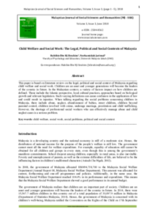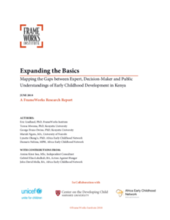Displaying 251 - 260 of 507
This study explored how organizational structure (dormitory vs family unit) and funding sources (government vs private) influence the work and health of individuals employed as caregivers in children’s homes in Ghana.
This study contributes to the development of understanding of empathy as a social work skill through a mixed‐methods analysis of 110 audio recordings of meetings in a child protection service between workers and parents, applying a coding framework for analysis.
This article presents findings from a cross-national study exploring how social workers in child welfare conceptualise ‘family’, and how they relate to ‘family’ in their practice.
In this article, the argument is made for having a positive error culture in child protection to improve decision‐making and risk management.
This quantitative study investigated the relationship between compassion fatigue, compassion satisfaction and work engagement in staff working in independent residential childcare organisations in England, Scotland and Wales.
Advancing Partners & Communities (APC) is a five-year cooperative agreement funded by the U.S. Agency for International Development beginning October 1, 2012. The project focuses on advancing and supporting community programs that seek to improve the overall health of communities and achieve other health-related impacts, especially in relationship to family planning. APC provides global leadership for community-based programming, executes and manages small- and medium-sized sub-awards, supports procurement reform by preparing awards for execution by USAID, and builds technical capacity of organizations to implement effective programs.
Family Care for Children with Disabilities: Practical Guidance for Frontline Workers in Low- and Middle-Income Countries was developed to help front-line personnel (social service workers and others) in low- and middle-income countries to work effectively with children with disabilities and their families.
This paper is based on literature review on the legal, political and social context of Malaysia regarding child welfare and social work.
This report considers a set of key overlaps and gaps in understanding of children’s early development and perception among experts, the Kenyan public, and people who work and make decisions in the early childhood development (ECD) sector in Kenya.
This document outlines the priority actions to which the Government of Lao PDR is committed to pursuing in order to tackle violence against children in the country.

